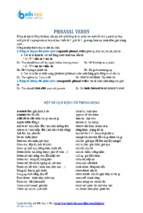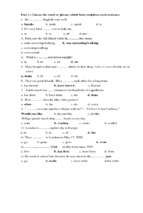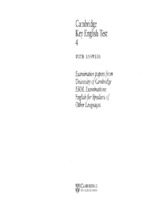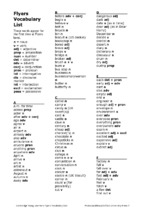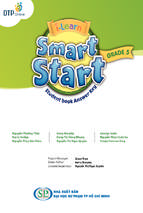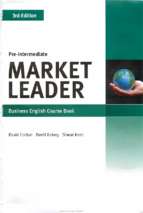VIET NAM NATIONAL UNIVERSITY, HA NOI
UNIVERSITY OF LANGUAGES & INTERNATIONAL STUDIES
FACULTY OF POST – GRADUATE STUDIES
*****************
ĐỖ THỊ HUYỀN
A SURVEY ON THE IMPACT OF THE MARKETIZATION OF
ENGLISH ON PARENTS'ATITUDES TOWARD THEIR YOUNG
CHILDREN LEARNING ENGLISH
(KHẢO SÁT VỀ SỰ TÁC ĐỘNG CỦA THỊ TRƯỜNG HÓA TIẾNG ANH
ĐỐI VỚI THÁI ĐỘ CỦA CHA MẸ CHO TRẺ CON HỌC TIẾNG ANH)
M.A. MINOR PROGRAMME THESIS
Field
: English Teaching Methodology
Code
: 8140231.01
Hanoi – 2020
VIET NAM NATIONAL UNIVERSITY, HA NOI
UNIVERSITY OF LANGUAGES & INTERNATIONAL STUDIES
FACULTY OF POST – GRADUATE STUDIES
*****************
ĐỖ THỊ HUYỀN
A SURVEY ON THE IMPACT OF THE MARKETIZATION OF
ENGLISH ON PARENTS'ATITUDES TOWARD THEIR YOUNG
CHILDREN LEARNING ENGLISH
(KHẢO SÁT VỀ SỰ TÁC ĐỘNG CỦA THỊ TRƯỜNG HÓA TIẾNG ANH
ĐỐI VỚI THÁI ĐỘ CỦA CHA MẸ CHO TRẺ CON HỌC TIẾNG ANH)
M.A. MINOR PROGRAMME THESIS
Field
: English Teaching Methodology
Code
: 8140231.01
Supervisor : Mr. Le Van Canh, Assoc. Prof.
Hanoi – 2020
DECLARATION
I, Do Thi Huyen, hereby certify that my thesis entitled A survey on the
impact of the marketization of english on parents'atitudes toward their young
children learning english
( Khảo sát về sự tác động của thị trường hóa tiếng Anh đối với thái độ vủa cha
mẹ cho trẻ con học tiếng Anh) submitted to the Faculty of Post- Graduate Studies,
University of Languages and International Studies, Vietnam National University,
Hanoi is my own work. I have not submitted this thesis for assessment in any other
training institutions and documented references have been fully provided.
Hanoi, 2020
Do Thi Huyen
i
ACKNOWLEDGEMENTS
I would like to express my special and sincere thanks to my supervisor, Mr.
Le Van Canh, PhD, my supervisor, who has patiently and constantly supported me
through the stages of , and whose stimulating ideas, expertise, and suggestions have
inspired me greatly through my growth as an academic researcher.
I also want to express my profound gratitude to all the doctors, lecturers and
staff members of the Faculty of Postgraduate Studies, University of Foreign
Languages and International Studies, Vietnam National University, Hanoi for their
valuable lectures and useful advice that is of a great help for me to fulfill the thesis.
I would also like to send my deep sense of thanks to all enthusiastic parents
as well as the principles at some surveyed primary schools for their cooperation and
the valuable information they provided in my research field. Without their
passionate participation and input, the validation survey could not have been
successfully conducted.
Last but not least, I must express my very profound gratitude to my family
members and to my friends for providing me with unfailing support and continuous
encouragement throughout my years of study and through the process of
researching and writing this thesis. This accomplishment would not have been
possible without them.
ii
ABSTRACT
This study investigated the parents' attitudes towards their children' English
language learning under the impact of marketization of English at some Primary
schools in Khoai Chau district, Hung Yen province. A questionnaire survey was
conducted by google.form and only 115 reponses of 350 parents were sent back. In
addition, the author had four interviews through Zoom with four primary school
leaders of different primary schools located in Hung Yen province and all these
were recorded fully and exactly. Beside the data was collected by means of the
questionnaire and interviewing, various information from advertisements on
posters, leaflets, mass media such as facebook, websites, etc., was also collected as
references of English training private companies‘ marketing strategies. The results
of the study showed the marketing strategies of these companies/centers had some
positive and negative impacts on the parents‘ attitudes but the positive ones
overweigh the drawbacks. And from the findings, some implications are also drawn
to school managers, parents as well as private education companies‘ managers.
iii
LIST OF FIGURES
Figure 4.1: The parental interest comes from poster advertisement ......................... 27
Figure 4.2: The parental interest come from advertisement details .......................... 28
Figure 4.3: The parental interest comes from various resources of multi-media ..... 29
Figure 4.4: The mental factors affecting parents ...................................................... 31
Figure 4.5: The parental reasons of applying for optional English program ........... 33
Figure 4.6: Parental ideas about the first time to learn English ................................ 34
Figure 4.7: Parental ideas about the first grade to learn English at school ............... 34
Figure 4.8: Parental ideas about English lessons per week....................................... 35
Figure 4.9: Parental ideas on choosing English program.......................................... 36
Figure 4.10: The most attractive factors on material for parents .............................. 38
Figure 4.11: The most outstanding features in the English teaching programs ........ 39
iv
ABBREVIATIONS
AEC
ASEAN Economic Community
ASEAN
The Association of Southeast Asian Nations
ACET
Australian Education and Training Center
ECA
The US Department of Education and Education
EFL
English foreign language
WTO
WorldTradeOrganization
IIE
The Institute of International Education
v
TABLE OF CONTENTS
DECLARATION ...................................................................................................... i
ACKNOWLEDGEMENTS ..................................................................................... ii
ABSTRACT ............................................................................................................. iii
LIST OF FIGURES ................................................................................................ iv
ABBREVIATIONS .................................................................................................. v
TABLE OF CONTENTS ........................................................................................ vi
CHAPTER I : INTRODUCTION .......................................................................... 1
1. Rationale of the study............................................................................................. 1
2. Aims and objectives of the study ........................................................................... 2
3. Research questions ................................................................................................. 3
4. Scope of the study .................................................................................................. 3
5. Method of the study ............................................................................................... 3
6. Significance of research ......................................................................................... 3
7. Organization of the thesis...................................................................................... 4
CHAPTER II: LITERATURE REVIEW.............................................................. 4
2.1 Review of theoretical background ....................................................................... 5
2.1.1 The spread of English to young learners ........................................................... 5
2.1.2 Neoliberalism in English language teaching ..................................................... 6
2.1.3 The marketization and marketing strategies .................................................... 8
2.1.4 Teaching English for young learners ............................................................... 11
2.1.5 Attitudes of parents and their impact on young learners‘ learning English ..... 15
2.2 Review of previous studies ................................................................................. 18
2.2.1 Previous studies overseas ................................................................................. 18
2.2.2 Previous studies in Viet Nam ........................................................................... 19
2.2.3 Summary .......................................................................................................... 20
CHARPTER III: RESEARCH METHODOLOGY ............................................ 22
3.1. Research methodology ....................................................................................... 22
3.2. Setting ................................................................................................................ 22
vi
3.3 Participants .......................................................................................................... 23
3.4 Data collection .................................................................................................... 24
3.5 Data collection instruments ................................................................................. 25
CHAPTER IV: DATA ANALYSIS AND FINDINGS ........................................ 27
4.1 Marketing strategies used by private education companies to marketize English
to young children at primary schools. ....................................................................... 27
4.2 Parents‘ attitudes towards children‘s learning English at primary schools ....... 32
4.2.1 Parents‘ awareness of English important role .................................................. 33
4.2.2 English teaching program‘s vital role .............................................................. 36
4.2.3 English learning environment .......................................................................... 38
4.2.4 Real achievements in English are highly appreciated ...................................... 39
4.3 Impacts of those strategies on parents' attitudes towards students' English
language learning ...................................................................................................... 41
4.3.1 Parents have positive attitudes ......................................................................... 41
4.3.2 Parents have negative attitudes ........................................................................ 42
4.4. School managers‘ attitudes towards the services of these private English
language training providers ....................................................................................... 43
4.4.1 Data analysis from 4 interviews ....................................................................... 43
4.4.2 Positive attitudes towards the services of these private English language
training providers ...................................................................................................... 45
4.4.3 Dissatisfied attitudes towards the services of these private English language
training providers ...................................................................................................... 46
4.5 Summary ............................................................................................................. 47
CONCLUSION ........................................................................................................ 48
REFERENCES ........................................................................................................ 51
APPENDIX 1 ............................................................................................................ I
APPENDIX 2 ......................................................................................................... VII
APPENDIX 3 ........................................................................................................ VIII
vii
CHAPTER I : INTRODUCTION
1. Rationale of the study
Although there are only 360 million native speakers in the world but it has
1.6 billion people use English as the first, second or third language. Over the
centuries, English has become a "bridge language" developing along with global
trade, diplomacy and culture. And despite the remarkable number of Chinese and
Spanish users - two of the most used languages in the world in terms of number of
native speakers, very few signs suggest that these two languages can challenge
English as "lingua franca" around the world.
Since the mid-1990s, foreign investment in Vietnam has increased markedly.
In a dynamic and effective working environment, young people in Vietnam are
required to have a broader understanding of economic, cultural and social issues. To
achieve this, foreign language is an important tool; it is a bridge for Vietnamese
workers to succeed in important positions at representative offices and companies
with 100% foreign capital in Vietnam. .
Recognizing that trend, international education institutions have pioneered
investment in Vietnam with the goal of spreading large-scale English and linking
international college and university programs. These companies have been
successful in the past, including the British Council (1993), the Apollo Education
and Training Organization (1994), LanguageLink Vietnam (1996) or Australian
Education and Training Center - ACET (2002).
In the context of Vietnam's integration into the world, and in particular the
establishment of the ASEAN Economic Community (AEC) by the Association of
Southeast Asian Nations (ASEAN) by the end of 2015, the training and capacity
building Foreign languages, especially English, are considered a priority (Dam
Xuan Yun, 2015). The Government of Vietnam set a target of "5% of cadres, civil
servants and public servants in state agencies with a foreign language level 3 or
higher by 2015 and 30% by 2020" (Decision No. 1400 / QD-TTg dated September
30, 2008 of the Prime Minister).
1
In Hung Yen City and neighboring provinces, the demand for learning
foreign languages, especially English, is still very high (Hung Yen Department of
Education and Training, 2017).
In the context of Vietnam's integration into the ASEAN Economic
Community, the need to learn and use foreign languages is very useful and urgent to
provide predictive information on the trends of learning and use. Foreign language
in the near future as well as identification of factors influencing the choice of
foreign languages to help educators and managers plan the development of
teaching, content, and methodology in program design (Jin, Liu, & Zhang, 2015).
As a primary English teacher, the author has witnessed how English has
become one of the compulsory subjects in the curriculum, how Vietnamese
education system appreciates the importance of English learning nowadays,
especially at primary school, and the importance of how parents motivate their
children‘s learning English is not only subject at school and their own concern, it is
also their parents‘ worry and interest. Many studies show that parents play an
important role in maintaining their children‘s ability as well as in participating for
success of school and learning. Besides, some ways to marketize education also
affect
their
educational
attitudes
positively or
negatively.
Some
gaps,
notwithstanding, have not been filled up to meet our curiosity on the impact of the
marketization of English on parents‘ attitudes toward their young children learning
English. Thus, the study reported in this thesis, on investigating the impact of
English marketization towards parents‘ attitudes on their children learning English
at Khoai Chau, Hung Yen Province.
2. Aims and objectives of the study
The study aims at investigating the impact of the marketization of
English on parents‘ attitudes toward their young children learning English at Dong
Tien Primary School in Khoai Chau, Hung Yen Province. This overall aim was
specified into the following objectives:
-
Explore the influence of marketing strategies on the parents‘ attitudes
towards their children‘s early English language learning.
2
Investigate the attitudes of the parents towards their children's early English
language learning in Khoai Chau, Hung Yen Province.3. Research questions
In order to achieve the above aims, the following research questions are
formulated:
(1) What marketing strategies do private education companies use to
marketize English to young children at primary schools?
(2) What are parents‘ attitudes towards children‘s learning English at
primary schools?
(3) What impacts do those strategies have on parents' attitudes towards
students' English language learning?
(4) How do the mareketization startegies for English language training
programs influence school managers‘ attitudes towards the services of these private
English language training providers?
4. Scope of the study
Due to limitation of time and knowledge, this thesis only focus on investigating
the impact of marketization on parents' attitudes toward their young children learning
English at Dong Tien Primary School, a medium - sized primary school of Khoai
Chau, Hung Yen, where the researcher is working as English foreign language (EFL)
teacher.
5. Method of the study
Both quantitative and qualitative methods were adopted for this study in
order to achieve its aims as stated above. An online survey method was adopted to
collect the data. The survey data was analyzed quantitatively by means of
descriptive statistics.
In addition to the survey questionnaire for parents, personal interviews were
conducted with five primary school leaders. The interview data was analyzed
qualitatively.
6. Significance of research
3
Findings of this study contribute to the knowledge of the influence of the
market-economy on English language education through marketization strategies
toward school managers as well as parents. Particularly, it adds to the ideology of
the ‗early the better‘ assumption in the field of English language education.
7. Organization of the thesis
The study is organized 5 chapters as follows:
Chapter 1, INTRODUCTION, presents rationale, objectives, research
questions, scope, methods, significance, and design of the study.
Chapter 2, LITERATURE REVIEW, theoretical background presents
relating to the characteristic of young learners , attitudes , marketization, and
parents‘ attitudes towards their children‘s EL learning and its impact.
Chapter 3, METHODOLOGY, introduces the research context and
methodology of the study including the context, the subject, the data collection
instruments, data collection procedure, and data analysis.
Chapter 4, FIDNDINGS AND DISCUSSION investigates the impact of the
marketization of English on parents‘ attitudes toward their young children‘s
learning English and suggestions for parents to support their children‘s EL learning.
Chapter 5, CONCLUSION, offers a summary of the key findings,
implications, limitations, and future directions for further study.
CHAPTER II: LITERATURE REVIEW
4
In this section, previously studies in the detail fields of the impact of
marketization to education and attitudes of parents toward young learners‘ learning
English will be presented and discussed. This must be done in order to place the
thesis in the context relevant to the research which will be conducted. Furthermore,
it will provide the readers with some basic knowledge of the background and
present state of this field of research.
2.1 Review of theoretical background
2.1.1 The spread of English to young learners
The widespread introduction of languages in primary schools has been
described by Johnstone (2009) as ―possibly the world‘s biggest policy development
in education‖ (p. 33), with English being the language most commonly introduced.
There are several reasons for this trend. First, it is often assumed that it is better to
begin learning languages early (Y. Hu, 2007; Nunan, 2003). Second, economic
globalisation has resulted in the widespread use of English and many governments
believe it is essential to have an English speaking workforce in order to compete
(Enever& Moon, 2009; Gimenez, 2009; Y. Hu, 2007). Third, parents want their
children to develop English skills to benefit from new world orders and put pressure
on governments to introduce English to younger children (Enever& Moon, 2009;
Gimenez, 2009). In parallel with this expansion, there has been increasing criticism
of the growth of English as a global lingua franca, in particular thepolitical and
social implications. Publications by Block, Gray, and Hol-borow (2012), Coleman
(2011),
Edge
(2006),
and
Kumaravadivelu(2011)
have
all
challenged
understandings of the place of English,how it has reached its current level of
popularity, whose interests therise of English serves, and the status of different
world Englishes. Suchdiscussions call into question the underlying premises on
which theintroduction of learning English at an early age are predicated (seealso
Pillar & Cho, 2013). Edge (2006) and Kumaravadivelu (2011) inparticular are also
highly critical of wholesale adoption of Westernapproaches to language teaching
5
which support the spread of English while ensuring Western countries continue to
benefit from it. Againstthis background, teachers of young learners around the
world mustdaily fulfill the tasks of instructing their students, often being requiredto
use a pedagogic approach which is alien to many, and having to persuade their
students of the value of learning English. It can be sais that the introduction of
English in primary education curricula is a phenomenon occurring in many nonEnglish-speaking countries in Asia, including Vietnam. Recently, the Ministry of
Education and Training (MOET) in Vietnam issued guidelines for the piloting of an
English as a foreign language (EFL) primary curriculum in which English is taught
as a compulsory subject from Grade 3; however, there is limited research on the
practices required to successfully implement this policy.
2.1.2 Neoliberalism in English language teaching
2.1.2.1 Neoliberalism definition
Neoliberalism has been difficult to define owning to the complexity,
elasticity, inconsistency of its meaning, the apparent gaps between theory and practices
of its advocates ( Block, Gary, &Holborow, 2012). Generally speaking, the term
―Neoliberalism‖ refer to the philosophy of economic and social transformation taking
place according to the logic of free market doctrines that dictate the way and society
function. These free market doctrines are ―rooted in much deeper structural and
systemic changes in our conception of the politics and the practices of governing‖ (
Oksala, 2013, P53).
2.1.2.2 Neoliberalism in English education
Over the reality of neoliberal globalization has placed different demands on
education and brought about changes to the very concept of education in both
Western and non-English-speaking countries. One of the most noticeable changes in
the field of education in the twenty-first century is the emergence of contested
concepts such as the ― knowledge (based) economy‖ and ―knowledge as intellectual
capital‖ ( Burton-Jones, 1999). Roberts and Peters(2008) in their book entiled
Neoliberalism , Higher Education and Research further argue ― the most significant
material change underpinning neoliberalism in the 21st century is the rise in the
6
importance of knowledge as intellectual capital‖. ― If transformation in knowledge
production entails a rethinking of economic fundamentals, the shift to a knowledge
economy also requires a profound rethinking of education as emerging forms of
knowledge capitalism, involving knowledge creation, acquisition, transmission and
organization‖( pp.17-18). And according to Down ( 2009, p.52), within this market
framework, education is being conceived as a source of knowledge
and skill
contributing to economic growth, and ― the role of schools is to prepare students as
enterprising workers and citizens with the prerequisite skills, knowledge and values
to survive in a volatile and competitive global labour market‖. This is exactly what
Ball( 1999, p.198) is referring to when he argues that, under the neoliberal
globalization of education, ― schools become more like business and more businesslike‖. These movements towards a knowledge economy have necessitated a
rethinking of education systems both in Western and non- English-speaking
countries. And there are also other ways in which the policies of neoliberal
economic globalization have resulted in converting education into business.
Regarding English, neoliberal thinking postulates that English is linked to
economic benefits. Specifically, English is promoted as key to future economic
successes such as good jobs, good opportunities for social upward movement, etc.
So, it spreads the myth that without proficiency in English, young people are likely
to be disadvantaged or even marginalized. It is this myth that motivates
governments to implement the ‗younger the better‘ or the ‗earlier the better‘ policy
in English language teaching and learning. Parents, on their part, are persuaded to
invest heavily in their children‘ learning English even without the clear purposes of
using English. Education businesses take full advantage of this to make profits, and
the market for English is ever being expanded.
2.1.2.3. English language market in Vietnam
With a population of nearly 100 million, Vietnam has become an attractor to
private international and domestic English language training providers. In reality, it
is no exaggeration to say that English language centers in Vietnam mushroomed
everywhere, first in big cities like Hanoi, Ho Chi Minh City, Da Nang, then to the
7
rural areas. In addition to big international education groups such as Apollo,
Cambridge Education Group, Language Link, etc, there are numerous domestic
groups, big and small. The rapid mushrooming of these ‗English Language Centers‘
shows that English is a profitable commodity. By using different strategies, these
English language training providers have managed to convince parents that
investment in their children‘s learning English is an investment for the future. This
is not to say that these businesses find all means to convince school leadership to
host their English programs.
In short, neoliberalism in English education grows all over the world and
English language market in Vietnam is increasingly developing so it is said that it is
an opportunity for private companies on English language training to grow.
However, how successful they can achieve depends on their own marketization and
marketing strategies.
2.1.3 The marketization and marketing strategies
2.1.3.1 The definition of the marketization
According to Raffe and Croxford (2013), the theory of marketization
provides a good foundation to nations in introducing the aspects of choices,
competition, and public accountability, which are essential in enhancing the quality
of products or services under production. Evidently, the theory of marketization
helps in eliminating different economic problems and concepts such as unfavorable
market competition, inefficiencies in markets, and the lack of players and market
forces that are likely to influence the production process. From the perspective of
the marketization theory, a number of economies across the globe are calling upon
for the deregulation of institutions of higher learning with the aim of making them
more competitive within the global market.
Marketing and marketization are not the same. However, it is nor a simple
task to disentangle one from the other. At one end of the distribution of meaning,
marketing may be taken to be about the provision of information to help people
make decisions, while at the other end of distribution, marketization challenges
8
stakeholders with radical change encompassing issues of power, funding, labour,
markets, and complexity. Nor is this a comprehensive list.(see, e.g., HemsleyBrown & Oplarka, 2006).
2.1.3.2 The main marketing strategies
Julie Chance
(2020),
8 Keys to a
Strong
Marketing Strategy;
https://www.businessknowhow.com/marketing/blocks.htm showed that the key is
developing a marketing strategy that forms a solid foundation for your promotional
efforts. ― Implementing promotional activities such as advertising, direct mail or
even networking and one-to-one sales efforts without a marketing strategy is like
buying curtains for a house you are building before you have an architectural plan.‖
A company can develop a strong marketing foundation by:
1. Defining the product or service clearly which company provides customer.
2. Identifying the target market: The ideal customer should be defined in
terms of income, age, geographic area, number of employees, revenues, industry,
etc because the time or money to market them would not be wasted.
3. Knowing the competition: Even if there are no direct competitors for the
company service, there is always competition of some kind. Something besides its
product is competing for the potential client‘s money.
4. Finding a niche: A niche strategy should be focused with marketing efforts
and dominating the market, even if company is a small player.
5. Developing awareness: It is difficult for a potential client to buy a product
or service if they don‘t even know or remember its exist. Generally a potential
customer will have to be exposed to a product 5 to 15 times before they are likely to
think of that product when the need arises. Needs often arise unexpectedly so the
product must be appeared in front of potential clients consistently if they are going
to remember it when that need arises.
6. Building credibility: Not only must clients be aware of a product or
service, they also must have a positive disposition toward it. Potential customers
must trust it Especially with large or risky purchases, you need to give them the
9
opportunity to ―sample‖, ―touch‖, or ―taste‖ the product in some way.
7. Being consistent: Be consistent in every way and in everything you do, which
includes the look of your collateral materials, the message you deliver, the level of
customer service, and the quality of the product. Being consistent is more important
than having the ―best‖ product. This in part is the reason for the success of chains.
8. Maintaining focus: Focus allows for more effective utilization of the scarce
resources of time and money. Your promotional budget will bring you greater return if
you use it to promote a single product to a narrowly defined target market and if you
promote that same product to that same target market over a continuous period of time.
In the other useful link, https://www.learncube.com/language-schoolmarketing-tips.html showed that there are some useful and outstanding marketing
tips on English education. First of all, in a competitive market, and where
competition is global in the online world, the company may need to adjust the
pricing, or give additional benefits to the program to attract enrollments. In some
case the program price may need to be reduced. In other cases increase them. As an
alternative to a price reduction company may increase the value of courses by
adding extra components that the competitors do not have. The second strategy is
the importance of good teachers. ―The teachers are your ambassadors that will
increase your likelihood for students to recommend your language school so don‘t
underestimate their influence for your students to enjoy their learning experience. In
general worldwide, teachers often change schools. Retaining good teachers in your
school is more likely if they can still be part of your school when they move to
another location‖. In addition, it is focusing on the students the center has. If it has
fewer students, it can focus on giving them top-notch service. It is necessary to
make sure that the students currently enrolled get the best quality program they
could possibly have from the center. Each and every student is a prospective referral
for center. No-cost or low-cost ways to focus on students include things like having
every person who works in the program learn the names of each and every student.
Personalized letters of congratulation to each student from the director at the end of
10
the program is another idea. Last but not least, the center should take time to
regroup, re-organize and even celebrate some interesting events, which remind
everyone that while these may not be the best of times, things will get better. It can
be necessary to clean out the teachers' offices, resource rooms, filing cabinets,
cupboards and bookshelves, organize a second-hand book sale of any old textbooks
or resources which are not needed. Especially, it is very useful to use the money to
take the students on a field trip or buy pizza for the staff on a Friday afternoon,
which can be a huge emotional investment in the mental health of staffs and
potential students.
To put it in a nutshell, these above strategies are rather useful for the author
to follow and with this research the author hopes to explore the marketing strategies
of some English training companies if they are affecting on parental attitudes
toward their children‘s English learning program.
2.1.4 Teaching English for young learners
To achieve success in teaching English in primary schools; it is very
important to know the characteristics of student. Teachers should understand young
learners instincts, interests, cognizance, emotional aspects an especially their
characteristics. There issues play a crucial role in how teachers plan a lesson, make
sure that the young learners are interested in and fully engaged in the whole process
of learning.
2.1.4.1 Characteristics of young learners\
Regarding learning foreign language, the characteristics of young learners
are mentioned by many famous linguistics such as Sadler (1974); Cameron (2001),
Brown (2001), Scott (1990) and Mustafa (2003), Pinter (2006) and Hammer (2007).
In this study, the author firstly focused the main characteristics mentioned by
Hammer (2007) and teachers should know to teach them effectively. These
characteristics include as followings:
- They respond to meaning even if they do not understand individual words:
In other words, learning will come from the real experience from the children‘s life.
- They often learn indirectly rather than directly - that is they take in
11
- Xem thêm -


